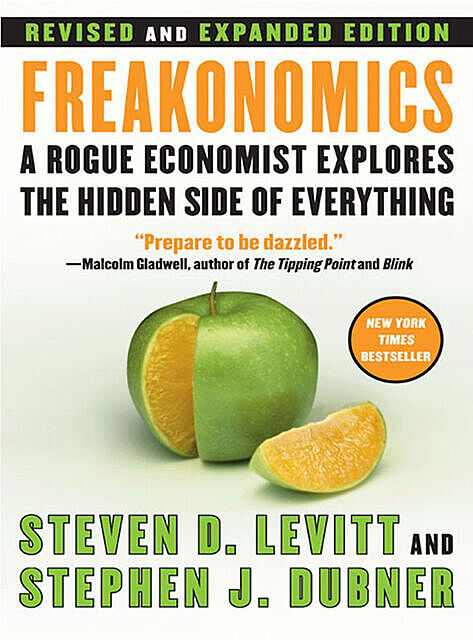Freakonomics
- Anindya Khas quoted8 years agowhen there are a lot of people willing and able to do a job, that job generally doesn’t pay well. This is one of four meaningful factors that determine a wage. The others are the specialized skills a job requires, the unpleasantness of a job, and the demand for services that the job fulfills.
- Alla Nabatovahas quoted9 years agothe risks that scare people and the risks that kill people are very different.
- Alla Nabatovahas quoted9 years agoUnseasonably pleasant weather inspires people to pay at a higher rate. Unseasonably cold weather, meanwhile, makes people cheat prolifically; so do heavy rain and wind.
- Anindya Khas quoted8 years agoEconomics is, at root, the study of incentives: how people get what they want, or need, especially when other people want or need the same thing. Economists love incentives.
- Anindya Khas quoted8 years agoIncentives are the cornerstone of modern life.And understanding them – or, often, deciphering them – is the key to understanding a problem, and how it might be solved.
Knowing what to measure, and how to measure it, can make a complicated world less so.There is nothing like the sheer power of numbers to scrub away layers of confusion and contradiction, especially with emotional, hot-button topics.
The conventional wisdom is often wrong.And a blithe acceptance of it can lead to sloppy, wasteful, or even dangerous outcomes.
Correlation does not equal causality.When two things travel together, it is tempting to assume that one causes the other. Married people, for instance, are demonstrably happier than single people; does this mean that marriage causes happiness? The data suggests otherwise – that happy people are more likely to get married in the first place. As one researcher puts it, “if you’re grumpy, who the hell wants to marry you?” - Anindya Khas quoted8 years agoCocaine had never been a big seller in the ghetto: it was too expensive. But that was before the invention of crack. This new product was ideal for a low-income, street-level customer. Because it required such a tiny amount of pure cocaine, one hit of crack cost only a few dollars. Its powerful high reached the brain in just a few seconds—and then faded fast, sending the user back for more. From the outset, crack was bound to be a huge success.
- Alla Nabatovahas quoted9 years agoInformation is a beacon, a cudgel, an olive branch, a deterrent—all depending on who wields it and how
- An Nguyenhas quoted10 years agoseeking to legalize abortion. The defendant was Henry Wade, the Dallas County district attorney. The case ultimately made it
- An Nguyenhas quoted10 years agomind. In short course, they became conventional wisdom.
There was only one problem: they weren’t true. - Sanzhar Surshanovhas quoted10 years agoAnother barrier to thinking like a Freak is that most people are too busy to rethink the way they think – or to even spend much time thinking at all. When was the last time you sat for an hour of pure, unadulterated thinking?
fb2epub
Drag & drop your files
(not more than 5 at once)


